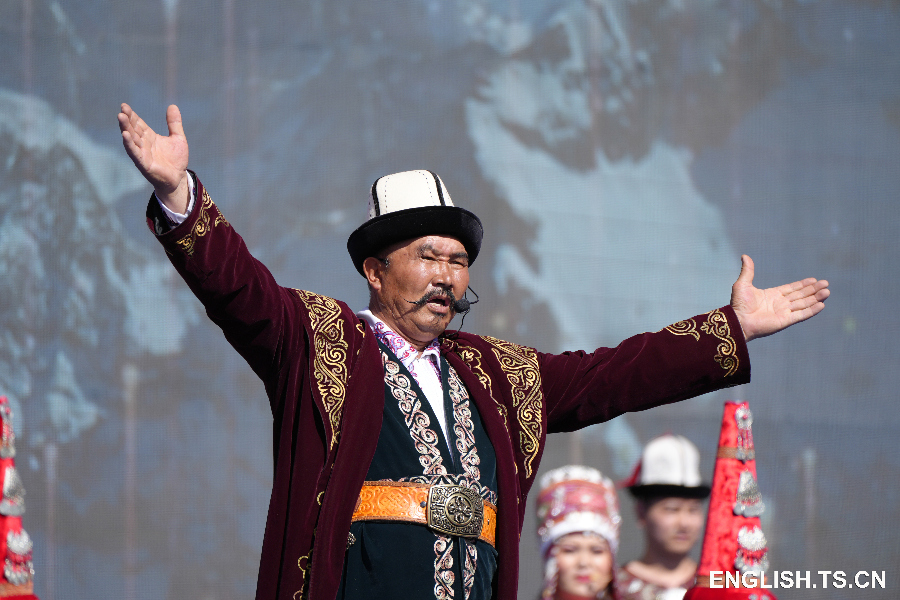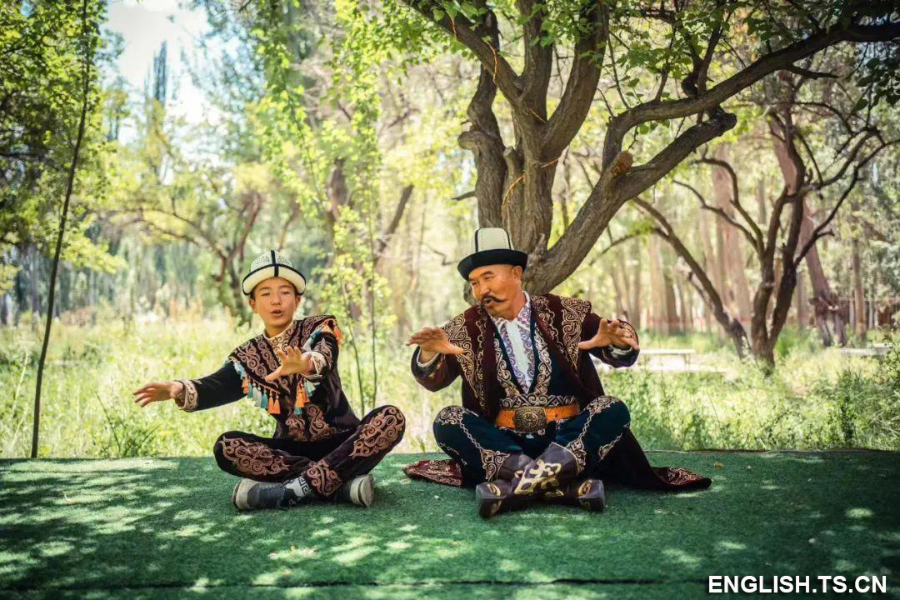Tianshannet-Xinjiang Daily (Reporter Song Weiguo) news: “Recently, I went to Shanghai and Chengdu to participate in the exhibition of intangible cultural heritage. The Epic of Manas is very influential in these cities. As inheritors of intangible cultural heritage, we must perform it well,” said Jiangnuri Turiganbayi to several intangible cultural heritage inheritors in Wuqia County on November 28.
Jiangnuri is a villager of Yeketiereke Village, Heiziwei Township, Wuqia County, and a region-level representative trustee of the national intangible cultural heritage Manas. Recently he just finished a performance at the 6th China International Import Expo, and then rushed to the site of the 9th China International Copyright Expo. At the two events, he performed excerpts of the Epic of Manas for the audience. The rounds of applause and the keen eyes of the audience showed him the love of the audience from all over the world for the Epic of Manas.

Photo shows Jiangnuri Turiganbayi sings the Epic of Manas in Wuqia County, Kizilsu Kirgiz Autonomous Prefecture, northwest China’s Xinjiang Uygur Autonomous Region. (Photo provided by Party Committee Publicity Department of Wuqia County)
“I am an inheritor of intangible cultural heritage and it is my responsibility to make Manas understood and loved by more people. I will keep performing Manas for the rest of my life,” said Jiangnuri.
A passion molded by childhood experience
Under the blue sky and white clouds, a dozen or so sheep walked leisurely on the pasture, while a man from the Kirgiz ethnic minority sang the Epic of Manas to a boy.
That boy was Jiangnuri, and this was a common scene in his childhood. In 1979, Jiangnuri, who had just turned 13, began learning to sing the Epic of Manas from his father. Initially, all he knew was that it was a fascinating story about a hero.
He acquired the skill from many teachers, including his father, his grandfather, and other elderly men in the village. The Epic of Manas is sung everywhere: at dinner parties, at pastures, and even in dreams. It is performed by different people in different venues and at different times.
“My childhood experience has written the Epic of Manas into my DNA, resulting in my lasting passion for it,” Jiangnuri said.
At the age of 13, Jiangnuri started learning to sing the Epic of Manas.
Through continuous learning, he came to understand the meaning of the epic: It is a heroic saga about Manas and his seven generations of descendants who lead the people from the Kirgiz ethnic minority to fight against foreign invasions and pursue a happy life.
The more he understands the Epic of Manas, the deeper he falls in love with it. When performing different parts, he will be immersed in the feelings of different characters. In performing the “Magical Birth” chapter, Jiangnuri brings infinite vitality to the audience with the light of hope in his eyes and his melodious singing. In the “Great Expedition” chapter, his low and powerful voice makes everyone feel the infinite power and determination to fight. In the chapter of “Magnificent Sacrifice”, he conveys endless sadness and full-blooded anger to the audience.

Photo shows Jiangnuri Turiganbayi (R) practices a performance of the Epic of Manas with his apprentice in Wuqia County, Kizilsu Kirgiz Autonomous Prefecture, northwest China’s Xinjiang Uygur Autonomous Region. (Photo provided by Party Committee Publicity Department of Wuqia County)
Jiangnuri’s immersive singing won the recognition of his fellow villagers who believed that the outstanding Jiangnuri would someday become a Great Manaschi. With everyone’s encouragement, in 1980, the 14-year-old Jiangnuri sang the Epic of Manas for more than an hour at a public performance, winning bursts of applause. In 1983, he sang from dusk to dawn at a wedding in Yuqitashi grassland in Wuqia County, and the herdsmen lifted up the tarpaulin of their yurts to listen to him under the starlit sky.
After each performance, many of the audience would present to him a white felt hat to show their respect, which bolstered his determination to continue singing the Epic of Manas.
“I have been singing the Epic of Manas for more than 40 years, and I still feel excited every time I sing,” Jiangnuri said.
On August 1, 1992, Jiangnuri left Wuqia County for Akqi County to participate in the Epic of Manas competition, in which he won a radio and an award certificate, but more importantly, he became an apprentice of Jusufu Mamayi, a representative trustee of Manas, which was among the first to be proclaimed as the national intangible cultural heritage. From then on, he learned to perform the Epic of Manas from Jusufu for 13 years, a most valuable experience for him.
The heroic epic that has been sung for thousands of years has written patriotism and hard work into the genes of the Kirgiz ethnic people from generation to generation, and Jiangnuri is no exception.
In Yeketiereke Village, the villagers will host an exchange party nearly every month, where they will honestly share their experience and even doubts about performing the Epic of Manas. Such meetings are spontaneous, and have no fixed place or schedule, not to mention podiums and seats; Any time someone starts talking about the Epic of Manas, the other enthusiasts will gather around in twos and threes.
Every time Jiangnuri is present, he would become the focus of everyone’s attention.
“Jiangnuri’s singing is very powerful and infectious,” said a fan of the Epic of Manas in Yeketiereke Village.
On July 13, 2022, Jiangnuri and eight other artists sang an excerpt of the Epic of Manas for Xi Jinping, General Secretary of the CPC Central Committee, at the Museum of Xinjiang Uygur Autonomous Region. That encounter with Mr. Xi and Xi’s instructions have since then been imprinted in Jiangnuri’s mind.
That experience has motivated him to keep moving forward. This year, Jiangnuri has taken on the responsibility of inheriting and promoting the Epic of Manas. He has traveled extensively outside Xinjiang to participate in exchanges and seminars, and to promote the Epic of Manas to more people, with a growing inner drive.
“The Epic of Manas is a treasure of the Chinese nation and the world’s intangible heritage. I feel honored and proud to have the opportunity to do something for it. I will keep singing the Epic of Manas for the rest of my life, and make it heard by more people,” Jiangnuri said.









